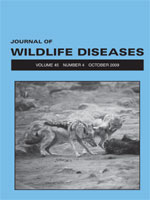Surveillance for evidence of West Nile virus (WNV) infection in small- and medium-sized wild mammals was conducted in Iowa, USA, from May 2005 to June 2007. Sera were collected from 325 mammals belonging to nine species and tested for antibodies to WNV and other flaviviruses by epitope-blocking enzyme-linked immunosorbent assay (ELISA). All sera that had antibodies to flaviviruses by blocking ELISA were further examined by plaque reduction neutralization test (PRNT). Thirteen mammals were seropositive for WNV by PRNT, including 10 raccoons (Procyon lotor). The seroprevalence for WNV in raccoons was 34%. Although a moderately high seroprevalence for WNV has been detected in raccoons in other surveillance studies in the United States, this has not been reported previously in Iowa or most bordering states. Together, these data indicate that raccoons are exposed to WNV at high rates throughout the United States. Two Virginia opossums (Didelphis virginiana) and one fox squirrel (Sciurus niger) were also seropositive for WNV. Nineteen mammals had antibodies to an undetermined flavivirus(es). In summary, we provide serologic evidence that raccoons in Iowa are commonly exposed to WNV.
How to translate text using browser tools
1 October 2009
Antibodies to West Nile Virus in Raccoons and Other Wild Peridomestic Mammals in Iowa
Bradley J. Blitvich,
Luis Ibarra Juarez,
Bradley J. Tucker,
Wayne A. Rowley,
Kenneth B. Platt

Journal of Wildlife Diseases
Vol. 45 • No. 4
October 2009
Vol. 45 • No. 4
October 2009
flavivirus
Iowa
mammals
Procyon lotor
raccoons
West Nile virus




